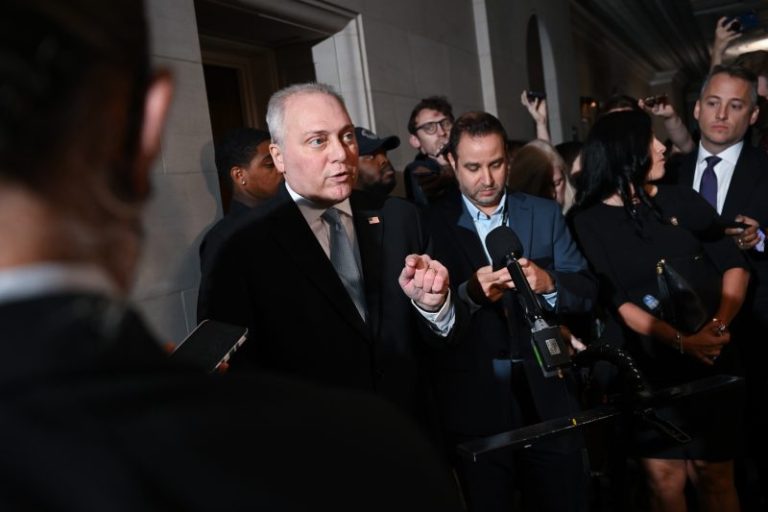Republicans have chosen to move forward with Majority Leader Steve Scalise (R-La.) as their nominee for the next House speaker.
That hardly guarantees him the job, given the Republican Party’s razor-thin majority and continued internal dissension. But it does make Scalise the most likely successor to Kevin McCarthy (R-Calif.) — at least for now.
So what might it mean if he’s ultimately elected in a vote of the entire House?
Scalise is generally viewed as a more conservative version of McCarthy. That’s something that might have played to his benefit in a vote of the GOP conference, but it makes his prospects for securing the 217 votes necessary to be elected uncertain.
While some McCarthy critics have indicated they will or might support him, including Rep. Matt Gaetz (R-Fla.), others will be distrustful of Scalise by virtue of his alignment with McCarthy and the GOP establishment. And the fact that Republicans didn’t move to a floor vote immediately after Wednesday’s conference vote betrays the uncertainty ahead.
Beyond that, it’s worth a review of where Scalise stands on key issues — not only because of how they might bear on the speaker votes, but what they suggest about what his speakership would look like.
Perhaps the policy issue of most immediate concern is the looming government shutdown, with the deal McCarthy cut giving Congress only until mid-November.
Scalise has historically been less in favor of such brinkmanship than the man the House GOP chose him over, Rep. Jim Jordan (Ohio), who spearheaded the GOP’s shutdown fights as a leader of the hard-right House Freedom Caucus. And he did vote for McCarthy’s deals with Democrats to end the recent shutdown and debt-ceiling fights. (Of course, anything less would have been highly unusual from the No. 2 House Republican.)
But despite the tight time frame for the looming shutdown, The Washington Post reported that Scalise has been reluctant to embrace another temporary extension. And in announcing his run for speaker, he indicated he might be in favor of a harder line in bargaining for policy concessions.
“Now we need to take [our] unified positions and work to extract conservative wins from the Democrat[ic] Senate and White House by leveraging upcoming deadlines,” he said last week. “If we stay united, we can preserve leverage for the House to secure tangible wins in our impending policy fights.”
Another big question looming over the next speaker is Ukraine funding. Large majorities of Congress have supported continuing aid to Ukraine, but a growing segment of the House GOP opposes it. And the major question is whether a speaker will even bring funding up for votes.
Scalise hasn’t, of late, made the kinds of strongly pro-Ukraine-funding comments that McCarthy did and has emphasized that the funding should be scrutinized. But he also called the war a “genocide” early on after Russia’s invasion. And unlike Jordan, he has repeatedly voted in favor of funding (including $40 billion last year) and against efforts to strip it (including the $300 million that nearly half of Republicans voted to eliminate two weeks ago).
He earned a “B” on the recent pro-Ukraine “Republicans for Ukraine” scorecard. That placed him more in favor of Ukraine funding than the median House Republican, but it dinged him for comments calling for more scrutiny of the funds.
As with McCarthy, the issue would seem to be less how Scalise feels personally and more how much political capital he’s willing to spend to secure the funding.
Allowing a vote on another major aid package could be a red line for at least some members (including Marjorie Taylor Greene) Scalise could need to secure the 217 votes for the speakership. McCarthy recently stripped that $300 million from a defense spending bill to secure its passage — a reflection of the difficult choices ahead.
While those are perhaps the two imminent areas in which a speaker could matter on the policy front, there are plenty of other ways in which Scalise could guide the party.
Some of the big ones have to do with Donald Trump and President Biden, whether that’s the new impeachment inquiry of Biden, the supposed “weaponization” of the government or election-denialism.
Scalise is seemingly less aligned with the hard right on these issues than Jordan, who leads the House GOP’s “weaponization” subcommittee and has spun elaborate conspiracy theories.
But Scalise has echoed much of the same rhetoric:
In August, he alleged that federal law enforcement is “being abused to go after political opponents.” He also baselessly suggested that Trump’s indictments are politically timed.Last year, he claimed that the FBI agents searching Mar-a-Lago went “rogue,” prompting pushback from a Fox News host.After the Jan. 6, 2021, attack, Scalise called the events at the Capitol “domestic terrorism.” But he voted to reject Biden electors that day and later voted against impeaching Trump.Scalise last month called the evidence against Biden “incredibly devastating already,” despite the GOP’s own witnesses at the first impeachment inquiry hearing acknowledging there was little direct evidence tying Biden to anything nefarious.
On just about all counts, Scalise is perhaps more within the GOP mainstream than Jordan and somewhat further to the right than McCarthy. But that GOP mainstream has also clearly shifted to the right in recent years.
Now we will see whether Scalise is viewed as sufficiently able to carry the Republican mantle forward — whenever the speaker vote on the House floor might actually come.

